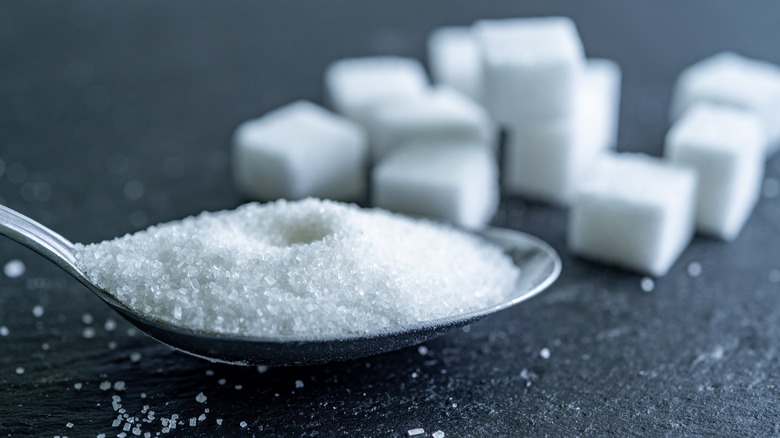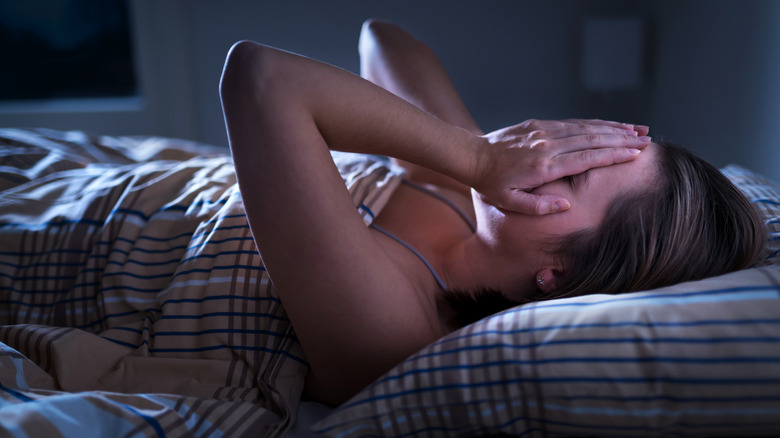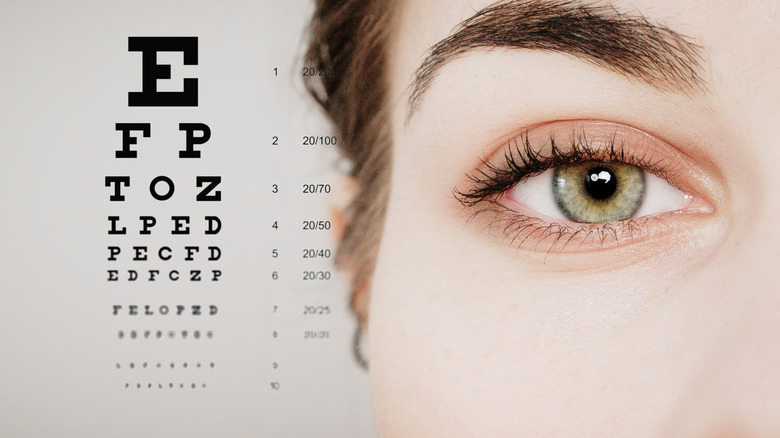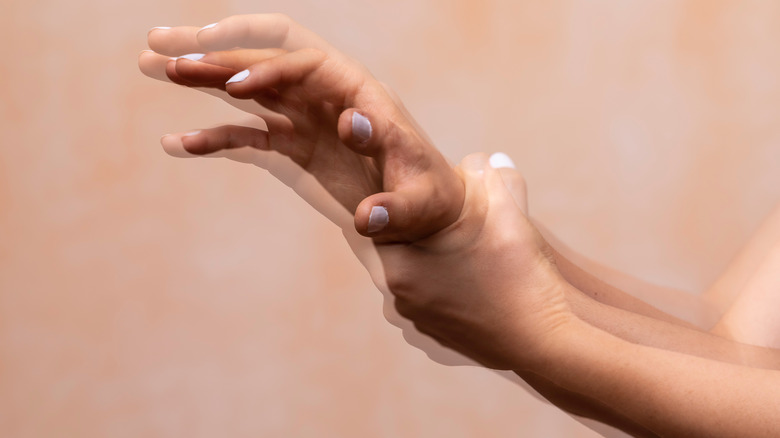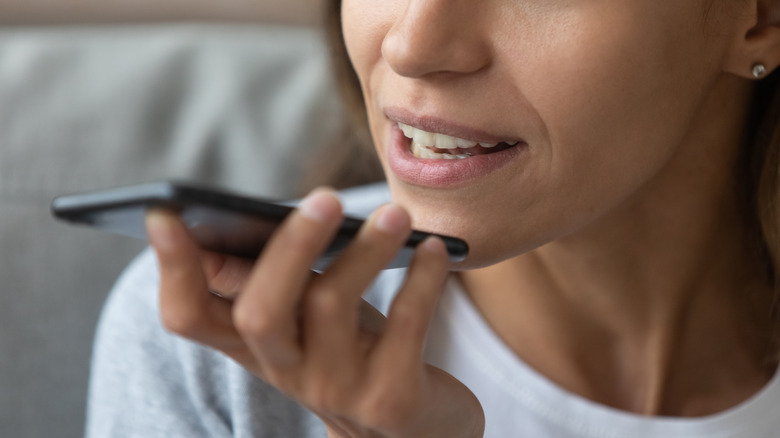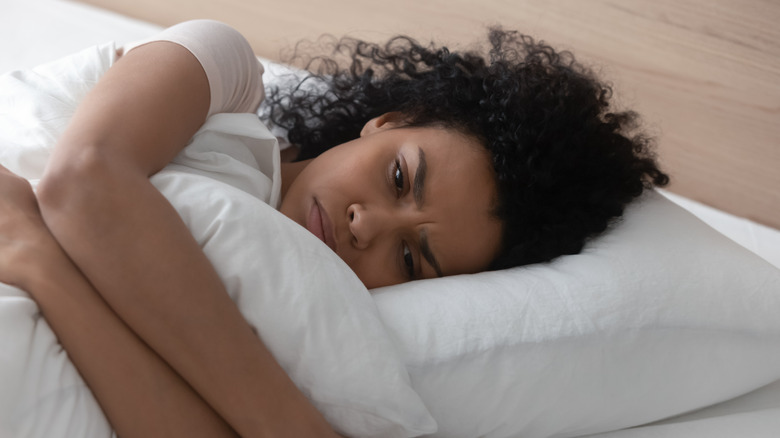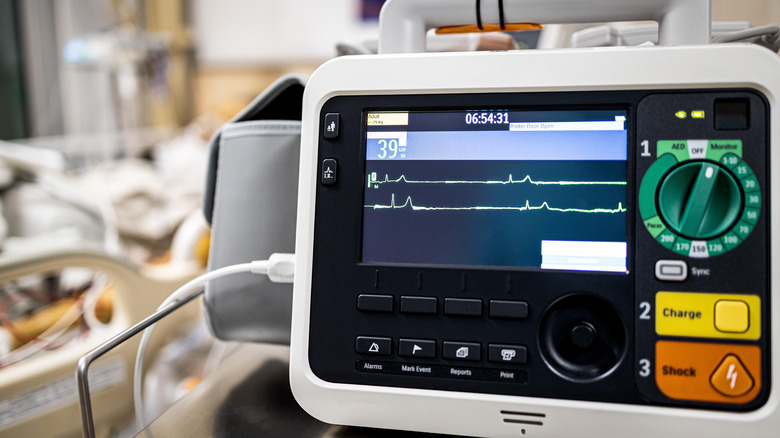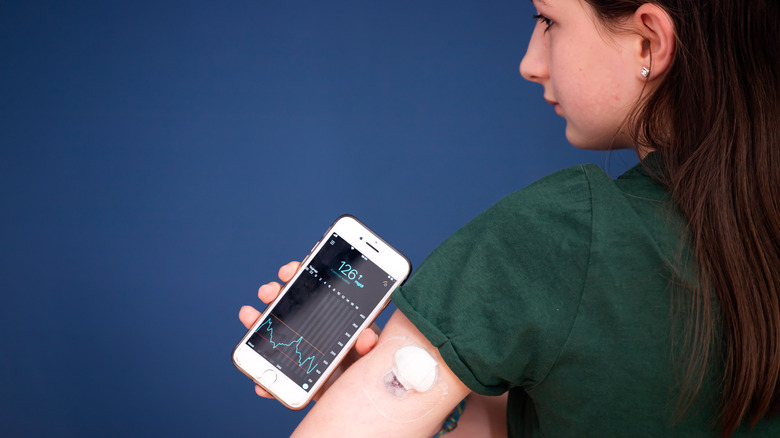12 Signs Your Blood Sugar Is Too Low
Your body is pretty darn good at keeping things running smoothly, and maintaining correct blood sugar is a huge part of that. When you eat, your body converts some of the food into blood sugar, which circulates your system, keeping you energized and ready for action (via Healthline). And that feeling of pre-lunch irritability, weakness, or tiredness? That's a sure-fire indicator that your blood, and your body, aren't getting enough of the sugar it needs. Low blood sugar, or hypoglycemia, "happens when the amount of blood glucose (sugar in the blood) drops to a level that's too low to sustain normal functioning," states registered dietitian and author of "Belly Fat Diet for Dummies" Erin Palinski-Wade to Everyday Health.
Palinski-Wade says that for the majority of people, "this is defined as a blood sugar level at or below 70 milligrams per deciliter (mg/dL)." And while hypoglycemia is highly important to watch out for if you have diabetes (with well over half of diabetic adults experiencing a hypoglycemic event at least once per year, according to a study published in BMJ Open Diabetes Research & Care), all of us need to keep an eye on our blood sugar levels — and there are many signs to watch out for. Let's take a look at some of the telltale indicators of low blood sugar in this article.
There are many factors that can cause low blood sugar
As blood sugar is directly affected by the amount, frequency, and type of food you eat, it's natural to assume that low blood sugar is always caused by not eating enough in non-diabetic people. But the truth is, low blood sugar can be caused by a host of things. Perhaps the clearest example of this is for people with diabetes, who can experience hypoglycemia by taking too much insulin, or too much exercise or too little food after insulin intake, according to Medical News Today.
But for people who don't have diabetes, lifestyle factors like drinking too much alcohol can also cause you to become hypoglycemic, as Medical News Today says, due to its interference with the liver's ability to regulate blood sugar, causing a dip in blood glucose. And certain medications, like antibiotics or medicines taken for malaria, can produce hypoglycemia as a side effect. Low blood sugar can also be a complication caused by health conditions other than diabetes, like hepatitis, pituitary or adrenal gland disorders, kidney conditions, and pancreatic tumors, as well as anorexia. There's far more that can cause a dip in your blood glucose than just not snacking regularly enough.
You start to feel a little irritable
The vast majority of us know the feeling: The person you're dining with is running a little late for dinner, and you're waiting to order, becoming more irate with each passing minute. Maybe it's because you're not a fan of tardiness, but it could also be a clear sign of a dip in blood sugar, manifesting through the deeply unpleasant feeling of being "hangry."
As gastroenterologist Christine Lee explains to the Cleveland Clinic, "There is a physiological reason why some people get angry when they're hungry." Lee further states that when it's been a while since you last ate, your blood sugar levels start to dive, and when this happens, adrenaline and cortisol are released in higher quantities into your bloodstream. In particular, "The release of cortisol can cause aggression in some people," Lee says, with low blood sugar also potentially getting in the way of brain functions that help you manage impulse control.
It's important to remember, however, as Erin Palinski-Wade, registered dietitian, states, "just because your stomach is rumbling doesn't always indicate that your blood sugar has fallen below a normal range" (via Everyday Health). Irritability doesn't necessarily equate to low blood sugar, and it's entirely possible to feel cranky when you're hungry when your glucose levels are stable.
You might start to sweat
If you've ever started to feel a little clammy toward lunchtime, it might not be the weather — your blood sugar could be starting to take a nosedive. According to the University of Michigan Health, one of the lesser-known signs of hypoglycemia is a case of sweats. While this symptom is more commonly associated with people with diabetes, says Diabetes UK's medical adviser Stephen Lawrence to the Daily Mail, it can also occur in people who don't have diabetes and is caused by the release of adrenaline that happens when your blood sugar drops.
In people with diabetes, hypoglycemia can cause sweating more notably, particularly in the form of night sweats (via Healthline). Lower blood sugar in the nighttime can be caused by taking insulin or other diabetes medication, and this triggers the release of adrenaline, causing sweating. If you're noticing that you're sweating at night and you have diabetes, it could be worth eating a small snack before bed to help stabilize your blood sugar, or else to consult with your doctor about your diet and exercise routine, to see if you can make any changes.
You'll probably start to feel hungry
So, this one might not come as a huge surprise — but when your blood sugar dips, the most likely way you'll know about it is you'll want to eat, fast. The sugar in your blood, registered dietitian Erin Palinski-Wade explains to Everyday Health, "is the main source of energy for our body's cells, especially the brain," and when your blood sugar dips, your cells aren't able to get the energy they need to carry on functioning at full throttle. When this happens, you start to feel hungry.
"In order to raise blood sugar levels, you need to eat," says Palinski-Wade. Bear in mind, though, that while consuming sugary drinks or starchy carbs can provide a quick correction to blood sugar levels when they dip, they may not provide lasting energy and blood sugar stability, which is particularly important for people with diabetes. Foods like whole grains, healthful fats, and non-starchy vegetables can be great choices to prioritize in your diet to help stabilize blood sugar and insulin, according to Medical News Today.
You could be having nightmares
It might not be the most obvious symptom, but a big sign of hypoglycemia during the night is experiencing nightmares — particularly in people with diabetes — which can sometimes be so intense that they wake you up from your sleep, according to Johns Hopkins Medicine. Nightmares are one of a range of symptoms of nocturnal hypoglycemia, which can also cause you to have restless sleep.
It's important to take note of any nightmares you have during the night and recognize that they're a potential sign of low blood sugar, as a case report published in Medicine discusses. Some uncommon sleep-based symptoms of hypoglycemia can be misdiagnosed as another condition. If you think your nocturnal disturbances or scary sleep might be due to hypoglycemia, it's important to consider your diet and exercise schedule pre-bedtime, and to potentially discuss this with your doctor, as nocturnal hypoglycemia can be dangerous to people with diabetes, says Johns Hopkins Medicine.
You might feel dizzy
Most of us have had the experience of feeling lightheaded if it's been a little too long since a snack. Well, that dizziness could be your blood sugar taking a nosedive, as Livestrong points out. When you don't eat enough to maintain your blood sugar levels, eventually your sympathetic nervous system is activated, releasing a flood of hormones into your system. It's this response that causes dizziness and lightheadedness, as well as the other classic symptoms of low blood sugar like hunger, weakness, and headaches.
According to MedicineNet, the dizziness you feel when you're hungry can be exacerbated by dehydration, so if you're not drinking enough water, as well as eating sufficiently, it could be a recipe for disaster. Remember, also, that there is a range of other factors and conditions that can cause dizziness beyond your blood sugar simply dipping, such as conditions that affect your inner ear like Meniere's disease. As always, it's important to notice how your diet affects your body's stasis — if eating doesn't take your dizziness away, it could be something else.
Harder to focus
Wait, what was that? If you're asking that question a few too many times, it might be a good idea to break for lunch. One of the classic signs that your blood sugar is getting too low is an inability to focus and concentrate, states Amanda Salis of the Boden Institute of Obesity, Nutrition, Exercise & Eating Disorders at the University of Sydney in The Conversation. This is all down to the brain not getting enough glucose from your blood, which it's dependent on for proper function. Once your blood glucose levels drop, and your brain's lacking in its course of energy, your mental function starts to decline, making it harder to pay attention or even do pretty simple activities.
This difficulty focusing is made worse by the fact that hunger, and low blood sugar, cause your energy levels to drop and you feel fatigue, Better Mind points out. This isn't just a problem for adults trying to get through their workday. As a report published by Kellogg's shows, missing meals and a lack of adequate fuel can have a profound effect on children's ability to focus and quality of learning.
Your vision might change
If you're noticing that things start to look a little different, it could be down to a lull in blood sugar. This may be a particularly common symptom for people with diabetes, for which hypoglycemia can produce visual symptoms with quite high frequency, despite them not being widely recognized as a sign of low blood sugar, according to a study published in AACE Clinical Case Reports.
As the study points out, the most common visual symptom of low blood sugar is the blurriness of sight, affecting almost three fourths of participants who reported visual changes in the study. Dimmer vision, "black spots," and double vision were also reported as changes occurring as a result of hypoglycemia. It's also important to stress, however, that blurred vision and visual changes are not merely a result of low blood sugar, but can be a sign of too-high blood sugar as well, according to WebMD. In this case, the elevation in blood sugar results in a swelling of the eye's lens, causing a change in your sight. Any persistent signs of vision change should be discussed immediately with a doctor.
You might feel shaky
Feeling a little unsteady is never pleasant, and noticing that you feel shakier could be because your blood sugar has dropped. The reason? The release of hormones that occur when your blood sugar is low, which acts as a warning sign to your body that you need to replenish its energy stores, as Healthline states. In particular, it's the release of the hormone epinephrine (also known as adrenaline) that gives you that trembly feeling, as well as instigating hunger pangs.
A feeling of shakiness, however, may not just be down to having low blood sugar — especially if you're experiencing it after eating a meal. While it may just feel as though you haven't eaten enough to restore your blood glucose to its proper levels, shakiness after eating could be a sign of idiopathic postprandial syndrome (IPS), or carbohydrate intolerance, according to Healthline. While it's unclear what causes IPS, and it doesn't usually necessitate medical intervention, it's worth noting that a lot of the symptoms are very similar to those of low blood sugar (such as headache, dizziness, impatience, and, of course, shakiness) — so if you're experiencing those signs after eating something which logically should restore your blood sugar, it's useful to bear in mind.
Slurred speech
One surprising and potentially unsettling sign of low blood sugar could be coming from your mouth. According to University of Michigan Health, slurred speech is an indicator of low blood sugar, commonly associated with a moderate drop in glucose, typically below 40 milligrams per deciliter (mg/dL). As well as output of language, too, hypoglycemia has also been associated with the ability to process language in general, as shown by a study published in Diabetes Care — so if you're finding it a little difficult to read, as well as to speak, it might be time to eat.
As University of Michigan Health points out, slurred speech is just one of several signs of moderate low blood sugar, which include unsteadiness when walking, twitching muscles, or unexpected emotional changes. As your blood sugar drops, your symptoms develop, and it could be useful to notice which symptoms are mild (sweating, hunger, and blurred vision) versus which are moderate (the aforementioned slurred speech and others), so you know when correcting your blood glucose levels is more urgent.
Disrupted sleep
Do you ever have trouble getting to sleep at night? If you do, you're not alone: Approximately one third of adults experience chronic insomnia, according to a study published in the Journal of Family Medicine and Primary Care. And if you're experiencing regular restlessness when you try and sleep, it could be down to your blood sugar too low at night, also known as nocturnal hypoglycemia, states Johns Hopkins Medicine.
In fact, as the National Institute of Diabetes and Digestive and Kidney Diseases says, having low blood sugar can cause interference and lower quality of sleep, even if you don't notice any symptoms. You might also, however, notice things like night sweats, feeling unrested or cranky after waking up (we've all been there), or crying out in your sleep, all of which can be signs that your blood glucose has dropped below normal levels. It's also worth pointing out that a healthy sleep cycle can help to regulate your blood sugar and keep it level, says the Sleep Foundation, as well as playing an important role in reducing the prevalence of obesity and diabetes.
In cases of severe low blood sugar, you could experience a seizure or diabetic coma
In most circumstances, a dip in blood sugar can be quickly rectified, before more serious symptoms occur. In some cases, however, blood sugar can drop to abnormally low levels, and when this happens it's important to act immediately to prevent profound symptoms. As MedlinePlus points out, having too-low blood glucose can cause seizures, as well as fainting and brain damage. Severely low blood sugar is a medical emergency and should be treated as such — contact with an emergency healthcare provider should be made immediately.
For people with diabetes, having severe low blood sugar can result in the onset of a diabetic coma, as WebMD explains. A diabetic coma can also occur during instances of hyperglycemia, when your blood sugar becomes dangerously high, and can happen when your insulin doses are irregular, thanks to changes in exercise or diet, or due to illnesses or hormone imbalances. Diabetic comas are often pre-empted by earlier physical symptoms of low or high blood sugar, and if you suspect that you're becoming close to a diabetic coma due to hypoglycemia, it's important to raise your blood sugar levels in a controlled manner, through small, regular intake of glucose tablets or regular soda, states WebMD.
You might notice heart palpitations
A certain pounding in your chest, your heart beating a little faster than usual, or a feeling of fluttering — all of these could be signs of low blood sugar. Heart palpitations can occur when your blood sugar drops thanks to the release of adrenaline into your bloodstream, which your body does to raise your blood sugar levels, as TeensHealth explains. This adrenaline can initiate a "fight-or-flight" response in your body, which leads to a pounding, quick heartbeat.
A sped-up heartbeat isn't the only cardiovascular symptom that can happen when your blood glucose levels fall, though. As a review published in the Indian Journal of Endocrinology and Metabolism shows, hypoglycemia has also been observed to cause low-frequency variations in a heartbeat. For people who experience severe hypoglycemic episodes, there's also an obstruction of blood flow to the heart, which can result in cardiac arrhythmia. And sudden death during the night, or "dead in bed" syndrome, has been observed in people with type 1 diabetes as a result of cardiac arrhythmia due to low nocturnal blood sugar. It should be noted, however, that instances of this are quite rare, as the above review states.
Become aware of your blood sugar levels and overall diet
So, you've noticed some symptoms of low blood sugar, and you're thinking you need to rectify it. What do you do?
Well, while you might think the answer is simply to eat, it varies more than you think. If you're not diabetic, the quickest way to rectify hypoglycemia is absolutely to consume something that contains glucose. This will give your blood a quick hit of what it needs, Healthline states, recommending something with approximately 15 grams of carbohydrates in it, like a glass of fruit juice. It might be beneficial to look at your overall diet, however, to examine whether your food choices are leading to hypoglycemia, and to focus on consuming complex carbohydrates that release energy over time.
If you have diabetes, you will naturally have more awareness of your blood sugar levels, and a greater need to monitor them correctly. If you suspect you've become hypoglycemic, check your blood sugar levels with a blood glucose meter, and if it's below 70 milligrams per deciliter (mg/dL), consume a small number of quick carbs, 15 to 20 grams, says the Mayo Clinic. Check your blood glucose again after 15 minutes, and if it's above 70 mg/dL, follow it up with a meal or snack, to stabilize your sugar levels.


